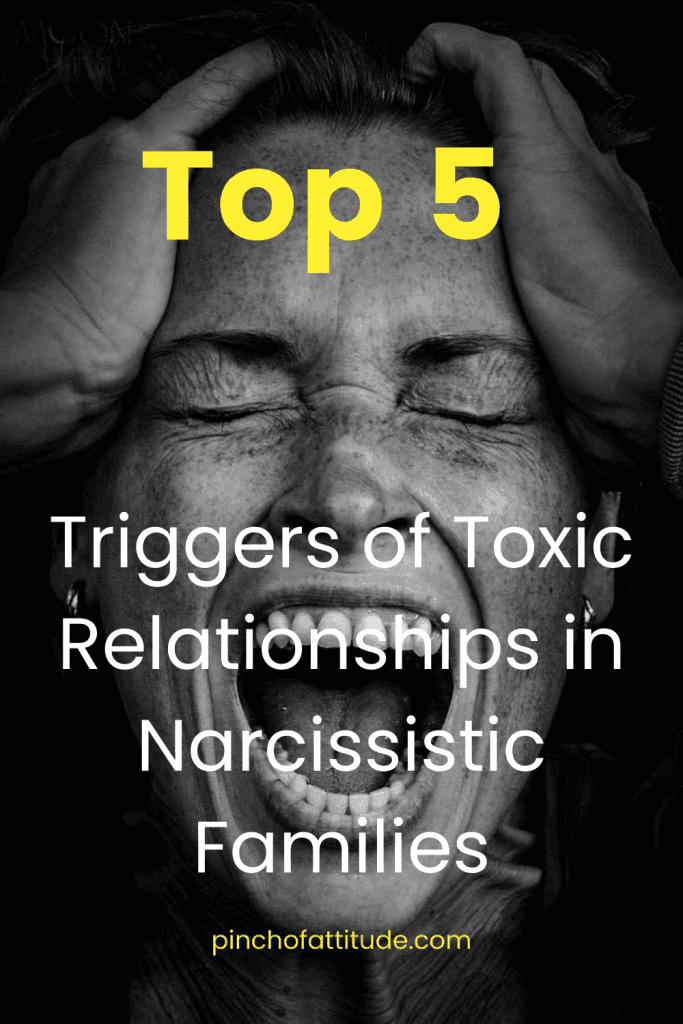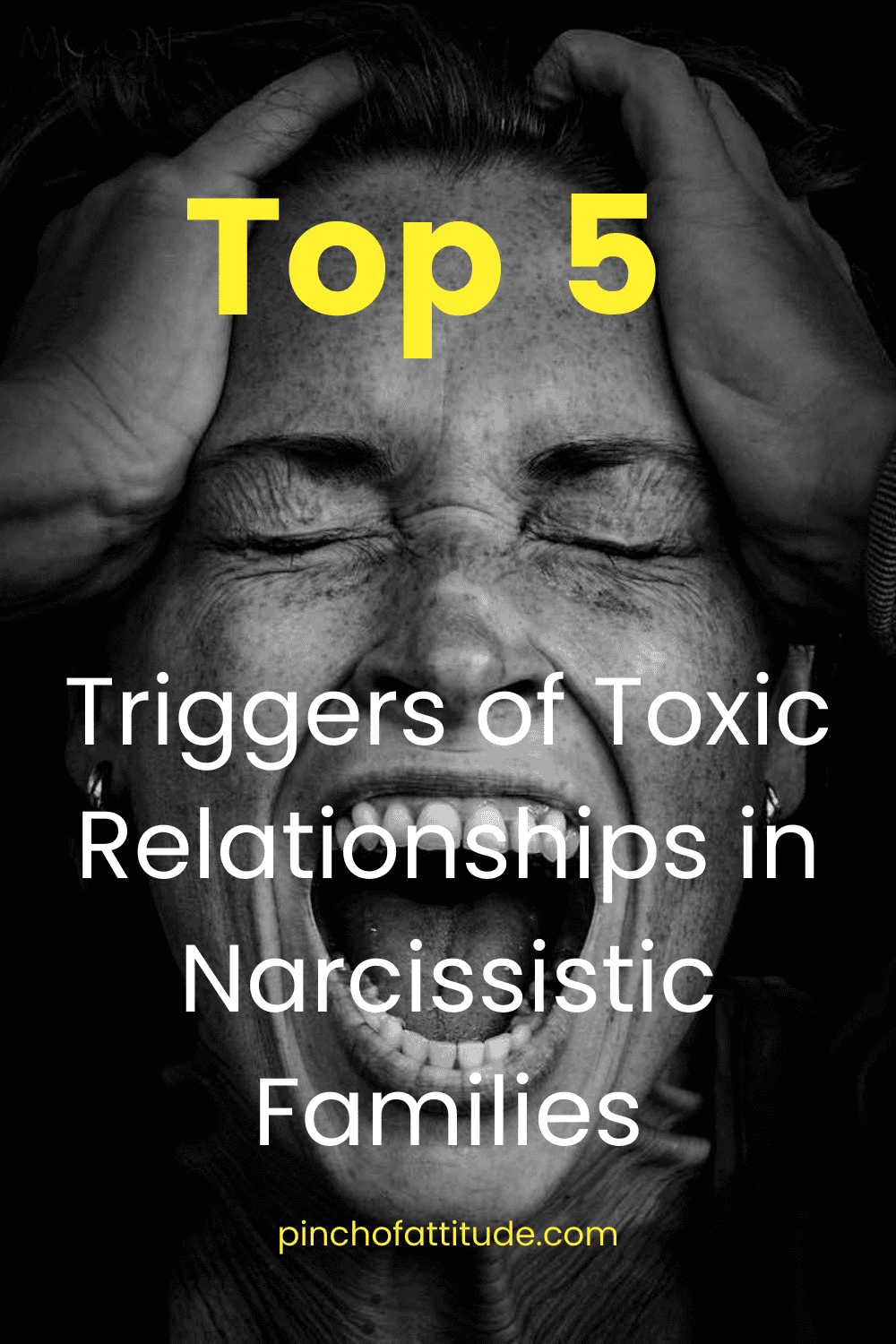Living with narcissistic family members? Oh, I feel you. It’s like walking on eggshells every single day, right? But here’s the thing, understanding what sets them off can give you a serious edge in managing those explosive moments.
Today, we’re diving deep into the five biggest triggers that send your narcissistic family members into a tailspin.
And trust me, knowing these can save you a ton of stress. So, let’s cut through the BS and get straight to it. Ready to take back some control? Let’s do this!
- Narcissists react explosively to criticism and rejection due to their fragile self-esteem.
- Ignoring their achievements or being outperformed by you can trigger their jealousy and insecurity.
- Public humiliation is their worst fear, leading to intense anger and efforts to shift blame.
Table of Contents
1. Criticism

If you’ve got a narcissist in your life, you know they can’t handle it. Like, at all. Even the tiniest bit of constructive feedback can send them spiraling.
Why? Because they have this inflated sense of self-importance and think they’re basically flawless. When you point out something they did wrong, you’re not just making a comment; you’re poking a bear. And that bear? It’s ready to claw back to protect its fragile ego.
Here’s the deal: Narcissists see criticism as a direct attack on their identity. It’s not just about the mistake; it’s about their whole self-worth being questioned.
Imagine if every piece of feedback you got felt like someone was saying you’re fundamentally flawed. That’s how it feels for them. They can’t separate the action from the person, so any critique feels like an existential threat.
Key Points:
- Narcissists perceive criticism as a direct attack on their self-worth.
- Their reactions can range from anger to denial to counterattacks.
- They have a fragile egos that cannot tolerate the idea of being flawed.
So, what happens when you criticize them? Brace yourself. They’re likely to react with anger, shouting, aggressive behavior, the whole nine yards. Or they might go into denial mode, completely refusing to acknowledge the validity of your comments.
Worse yet, they might turn the tables and start criticizing you. This counterattack is their way of deflecting the negative attention away from themselves and making you the problem.
Bottom line? Criticizing a narcissist is like lighting a fuse. You need to be prepared for the fallout. Sometimes, the best strategy is to choose your battles and find ways to give feedback that doesn’t threaten their sense of self.
But when you do have to speak up, know that their reaction is more about their own insecurities than anything you’ve done wrong.
2. Rejection

For narcissists, rejection is like kryptonite. They thrive on admiration and approval, so when they face rejection, whether it’s a social snub or a professional setback, it’s like their world is crumbling.
Rejection tells them they’re not as perfect or important as they believe, and that’s a hard pill for them to swallow.
Narcissists rely on external validation to prop up their fragile self-esteem.
So, when they get rejected, it’s a direct hit to their self-worth. It doesn’t matter if it’s a small slight or a big letdown, they react as if the sky is falling. They can’t process the idea that someone might not want or value them.
Key Points:
- Rejection undermines their need for validation and can lead to feelings of worthlessness.
- They may respond with rage, seeking to discredit or diminish the person or situation that rejected them.
- This reaction is often a defense mechanism to protect their fragile self-image.
What’s their reaction? It’s not pretty. They might lash out in rage, aiming to discredit or diminish the person or situation that rejected them.
They could go on a smear campaign, spreading negative stories to make themselves feel better. Or they might retreat into self-pity, sulking and playing the victim to garner sympathy and attention.
Dealing with a narcissist’s reaction to rejection requires patience and strategy. Recognize that their explosive response is about their own insecurities, not your actions.
Maintain your boundaries and avoid getting sucked into their drama. It’s their issue to manage, not yours. Stay strong and remember, you don’t owe them constant validation.
3. Ignoring or Not Acknowledging Their Achievements

Now, let’s talk about what happens when you don’t acknowledge a narcissist’s achievements. These folks live for recognition and praise.
If you ignore their accomplishments or don’t give them the admiration they crave, it’s like you’ve committed a cardinal sin. They need that constant reinforcement to feel good about themselves.
For narcissists, achievements are not just personal milestones; they’re proof of their superiority. When you fail to acknowledge their successes, it feels like you’re denying their greatness. And trust me, they do not handle that well. It threatens their self-image and makes them feel invisible and unimportant.
Key Points:
- Narcissists need constant reinforcement of their perceived greatness.
- Ignoring their achievements can lead to feelings of inadequacy and resentment.
- They may respond by boasting even more about their accomplishments or belittling others’ successes.
So, what happens next? Expect some serious drama. They might ramp up their bragging, telling anyone who will listen about their incredible feats.
They could also start belittling your achievements to make themselves look better by comparison. If they’re feeling particularly vindictive, they might even try to undermine your success to steal the spotlight back.
When dealing with a narcissist’s need for acknowledgment, it’s a balancing act. While it’s okay to give praise where it’s due, don’t feel pressured to constantly feed their ego. Acknowledge their achievements in a neutral, factual way without going overboard.
This can help keep the peace while maintaining your boundaries and self-respect.
4. Being Outperformed and Overshadowed by You

Let’s get real about being outperformed and overshadowed by you. Narcissists can’t stand it.
They see themselves as the star of the show, and when you start to outshine them, it’s like stealing their spotlight. Your success makes them feel inferior, and that’s something they just can’t handle.
Narcissists thrive on being the best, the smartest, the most accomplished.
When you achieve something significant, it challenges their self-perception. Instead of feeling proud or supportive, they feel threatened. It’s a blow to their ego and a reminder that they might not be as superior as they believe.
So, what do they do? Watch out for sabotage. They might try to undermine your success, spread rumors, or create obstacles to trip you up.
Key Points:
- Your achievements can trigger their jealousy and insecurity.
- They might try to undermine your success or sabotage your efforts.
- They often see others’ success as a reflection of their own failure.
If they can’t bring you down, they’ll try to downplay your achievements, making them seem less significant. They might even resort to copying you, trying to one-up you in any way they can.
Navigating this minefield requires confidence and a thick skin. Celebrate your successes and don’t let their insecurities diminish your achievements. Set boundaries to protect yourself from their negative behavior.
Remember, their reaction is about their own issues, not about your worth. Keep shining and don’t let their jealousy dim your light.
5. Public Humiliation or Embarrassment

Public humiliation or embarrassment is like a nuclear bomb for narcissists.
Their entire self-image is built on being admired and respected by others. When they are publicly embarrassed, it shatters this image and exposes their vulnerabilities for all to see. It’s their worst nightmare come true.
Narcissists work hard to curate a perfect image. They want everyone to see them as successful, confident, and in control. Public embarrassment strips all that away.
It makes them feel exposed, weak, and vulnerable. And they can’t stand it. The humiliation hits them on a deep level, threatening their carefully constructed facade.
Key Points:
- Public embarrassment is seen as a severe threat to their status and reputation.
- They may respond with intense anger, denial, or attempts to shift the blame.
- This reaction is an effort to regain control and protect their ego.
What’s their go-to reaction? Expect intense anger and aggression. They might lash out at the person who caused the embarrassment, often in a dramatic and over-the-top way.
If they can’t do that, they’ll go into damage control mode, trying to shift the blame and rewrite the narrative to protect their ego. They might also withdraw, sulking and plotting their revenge.
Dealing with a narcissist’s reaction to public humiliation requires a calm and measured approach. Don’t engage with their anger or attempts to shift the blame.
Maintain your composure and set clear boundaries. Remember, their reaction is about their own insecurities, not about you. Protect your peace and don’t let their drama pull you in.
Related Posts:
- What Happens When You Ignore a Narcissistic Family Member? It Gets Ugly!
- How to Set Boundaries With a Narcissistic Family? 15 Ways I Used That Work
- How to Protect Yourself From Narcissistic Family Members? My Personal Advice
- How to Escape a Narcissistic Family? My Guide to Your Safety
- What Happens When You Go No Contact With a Narcissistic Family? I Was in Heaven!
Frequently Asked Questions
How do I handle a narcissist’s reaction to criticism?
Stay calm, set boundaries, and avoid engaging in their defensive or aggressive responses.
What should I do if a narcissist sabotages my success?
Focus on your achievements, maintain boundaries, and don’t let their actions undermine your confidence.
How can I avoid triggering a narcissist’s jealousy?
While you can’t control their reactions, be mindful of how you present your successes and avoid unnecessary boasting.
What is the best way to deal with a narcissist’s need for constant validation?
Offer neutral acknowledgment without excessive praise and set clear boundaries for healthy interactions.
How can I protect myself from a narcissist’s anger after public humiliation?
Maintain your composure, avoid retaliating, and remove yourself from the situation if necessary to protect your peace.




